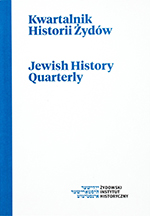Żydowskie elity wobec wybuchu II wojny światowej. Casus Szmula Zygielbojma
The Jewish Elites on the Outbreak of WWII. The Case of Szmul Zygielbojm
Author(s): Michał TrębaczSubject(s): Political history, Social history, Recent History (1900 till today), History of Judaism, History of Antisemitism
Published by: Żydowski Instytut Historyczny
Keywords: Shoah; Holocaust; Warsaw; Warsaw Ghetto; Judenrat; Jews; Bund; World War II
Summary/Abstract: The conditions of the German occupation meant that the situation of representatives of the Warsaw Jewish community and the leaders of Jewish political parties was complicated. The continually changing situation on the front, hopes for the help of Poland's allies and a rapid defeat of the Third Reich, and at the same time, the first anti-Jewish repression and evacuation of state authorities increased the feeling of uncertainty, making it difficult to make any decision. Politicians of the most important Jewish parties made the most crucial decision - stay or flee - as early as September 1939, without any precise knowledge of the situation at the front, without a ready plan for the near future. As it turned out, the leaders of a given group leaving Warsaw equaled his political activity to a standstill.Similarly, staying in the capital meant at least a desire to rebuild pre-war structures. The examples of Szmul Zygielbojm and Bund show that attempts to take public activity were doomed to failure. Nevertheless, the initiatives in which he became involved: active participation in defense of the capital, resumption of social activity, and above all, the restoration of party structures, were of crucial importance both for himself and the Bund.
Journal: Kwartalnik Historii Żydów
- Issue Year: 272/2019
- Issue No: 04
- Page Range: 891-908
- Page Count: 18
- Language: Polish

